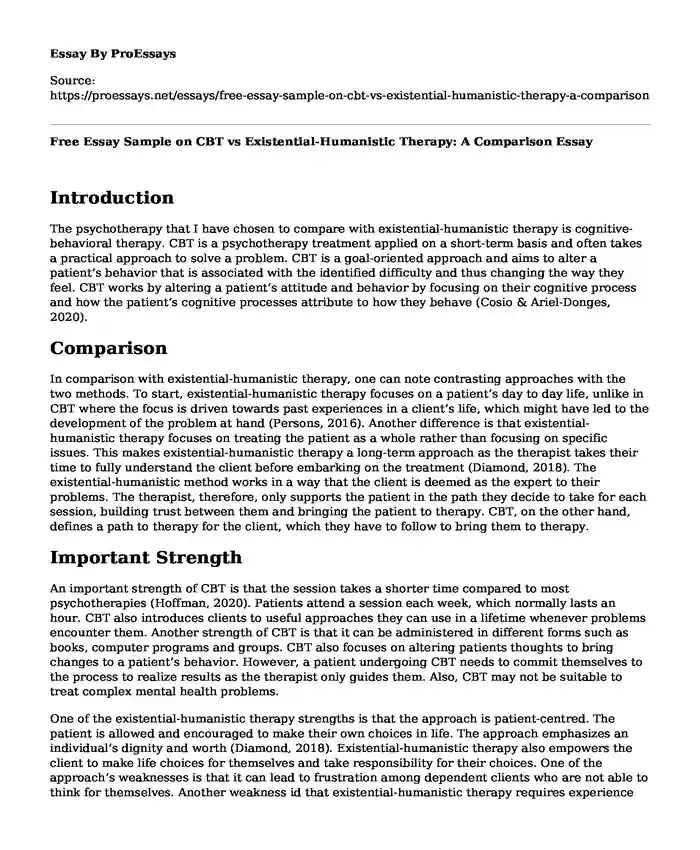Introduction
The psychotherapy that I have chosen to compare with existential-humanistic therapy is cognitive-behavioral therapy. CBT is a psychotherapy treatment applied on a short-term basis and often takes a practical approach to solve a problem. CBT is a goal-oriented approach and aims to alter a patient’s behavior that is associated with the identified difficulty and thus changing the way they feel. CBT works by altering a patient’s attitude and behavior by focusing on their cognitive process and how the patient’s cognitive processes attribute to how they behave (Cosio & Ariel-Donges, 2020).
Comparison
In comparison with existential-humanistic therapy, one can note contrasting approaches with the two methods. To start, existential-humanistic therapy focuses on a patient’s day to day life, unlike in CBT where the focus is driven towards past experiences in a client’s life, which might have led to the development of the problem at hand (Persons, 2016). Another difference is that existential-humanistic therapy focuses on treating the patient as a whole rather than focusing on specific issues. This makes existential-humanistic therapy a long-term approach as the therapist takes their time to fully understand the client before embarking on the treatment (Diamond, 2018). The existential-humanistic method works in a way that the client is deemed as the expert to their problems. The therapist, therefore, only supports the patient in the path they decide to take for each session, building trust between them and bringing the patient to therapy. CBT, on the other hand, defines a path to therapy for the client, which they have to follow to bring them to therapy.
Important Strength
An important strength of CBT is that the session takes a shorter time compared to most psychotherapies (Hoffman, 2020). Patients attend a session each week, which normally lasts an hour. CBT also introduces clients to useful approaches they can use in a lifetime whenever problems encounter them. Another strength of CBT is that it can be administered in different forms such as books, computer programs and groups. CBT also focuses on altering patients thoughts to bring changes to a patient’s behavior. However, a patient undergoing CBT needs to commit themselves to the process to realize results as the therapist only guides them. Also, CBT may not be suitable to treat complex mental health problems.
One of the existential-humanistic therapy strengths is that the approach is patient-centred. The patient is allowed and encouraged to make their own choices in life. The approach emphasizes an individual’s dignity and worth (Diamond, 2018). Existential-humanistic therapy also empowers the client to make life choices for themselves and take responsibility for their choices. One of the approach’s weaknesses is that it can lead to frustration among dependent clients who are not able to think for themselves. Another weakness id that existential-humanistic therapy requires experience by the therapist for them to apply a humanistic approach.
Conclsuion
Generally, CBT helps in identifying and dealing with their emotional problems. CBT can be used to treat problems such as alcohol and drug abuse, sleeping difficulties, and relationship problems. CBT resonates with me because of its short-term and goal-oriented approach, which implies that many patients with difficulties can be treated within a short period.
References
Cosio, D., & Ariel-Donges, A. (2020). Does Cognitive Behavioral Therapy increase acceptance of chronic pain amongst veterans? Journal of Behavioral and Cognitive Therapy.
https://doi.org/10.1016/j.jbct.2020.04.002
Diamond, S. (2018). Existential Therapy and Jungian Analysis: Toward an Existential Depth Psychology. Journal of Humanistic Psychology.
https://doi.org/10.1177/0022167818809915
Hoffman, L. (2020). Existential-Humanistic Therapy and Disaster Response: Lessons From the COVID-19 Pandemic. Journal Of Humanistic Psychology.
https://doi.org/10.1177/0022167820931987
Persons, J. (2016). Science in Practice in Cognitive Behavior Therapy. Cognitive And Behavioral Practice, 23(4), 454-458.
https://doi.org/10.1016/j.cbpra.2016.01.003
Cite this page
Free Essay Sample on CBT vs Existential-Humanistic Therapy: A Comparison. (2023, Oct 15). Retrieved from https://proessays.net/essays/free-essay-sample-on-cbt-vs-existential-humanistic-therapy-a-comparison
If you are the original author of this essay and no longer wish to have it published on the ProEssays website, please click below to request its removal:
- An AA Meetings Self-Reflection
- Children of Divorce Are Delayed in Many Aspects: Research Paper
- Essay Example on Ethical Challenges of 1950s Tacit Consent in NIH Research
- Essay Example on Most Suitable Org for Diabetes Treatment: Mayo Clinic
- Essay Sample on Stress: Benefits and Detriments to Mental and Physical Health
- Paper Example on Free Will vs Determinism: The Philosophical Debate
- Psychological Risks and Resilience in Children and Adolescents - Essay Sample







